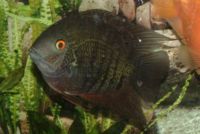Banded Cichlid (Heros severus)
From The Aquarium Wiki
Banded Cichlid
Heros severus
208 Litres (55 US G.)
15-24.9cm (5.9-9.8 ")
Freshwater
5.0 - 7.0
23 -29 °C (73.4-84.2°F)
6-8 °d
1:1 M:F
5-10 years
Family
Cichlidae
This animal is available captive bred
Contents
Additional names
- Severum, Banded Cichlid, Hero Cichlid, Green Severum, Gold Severum
Additional scientific names
- Cichlasoma severum, Heros notatus, Heros Sp. Rotkeil
Origin
- South America: Orinoco River basin, in the upper Orinoco River drainage in Colombia and Venezuela; Amazon River basin, in the upper Negro River basin.
Sexing
- The males and females have very similar colouration, however, the females are slightly paler and will not have any bars on their heads.
Tank compatibility
- Severums can be quite gentle and do well with most other mild tempered Cichlids. Firemouths, Acaras, and Blood Parrot can all make excellent tank mates provided the tank is large enough. Keep in mind that these fish do get rather large though, so choose other fish carefully as they need to be similar sized and fast swimming. Some possibilities are Congo Tetra, Black Skirt Tetra, and Silver Dollar Tetra.
Diet
- Severums will accept most any food that is presented to them. They do enjoy greens mixed in with the diet.
Feeding regime
- Feed once or twice a day.
Environment specifics
- Keep a soft substrate like sand for the bottom as they like to dig a little. Plants are not recommended because again they dig, and often uproot them as well as their desire to eat anything green in the tank. Provide a cave or hiding spot for Severums to feel safe as well as plenty of open swimming area. It is not recommended to keep a single fish in a tank smaller than 189 Litres (50 US G.) as adult.
Behaviour
- A generally peaceful fish, the Severum will defend itself against aggressors though. The fish will also defend its territory, though disputes usually end peacefully.
Identification
- The Severum is quite rounded in shape with strong lateral compression. The wild form of this fish is variable but usually a brownish to greenish with some having a brassy colour, on the flanks can be seen 8 or 9 vertical bars, these bars are more pronounced on the juveniles and by the time they reach maturity only the last one is still really visible. These bars tie together a large pale-edged black spot on the soft rayed part of the dorsal fin and a similar spot is also on the anal fin. On the flanks each scale seems to be marked with a brown-red dot giving the fish a beautiful sheen. The head of the males has a pattern of red, brown and blue-green markings. The iris of the eyes is a distinctive red. The caudal fin is yellow-green to grey-green and sometimes there is a band across the base of the fin. The ventral and dorsal fins are dark in colour and lighten to an olive green colour in the soft areas. There is also a "Gold" variant available.
Pictures
Videos
External links
- Fishbase (Mirrors:
 )
)



